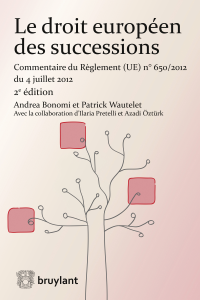Written by Eloïse Glucksmann
The Center for Private International Law and International Trade Law (CRDI) of the University Panthéon-Assas is pleased to invite you to a conference on the “UNCITRAL Contribution to International Trade Law” that will take place in the faculty premises at 92, rue d’Assas 75005 Paris, conference room no 315, on April 12, 2016. Speeches will be in French.
Please register by contacting laurence.tacquard@u-paris2.fr. This conference is also accountable for the lawyers’ continuing training (formation continue des avocats) of the French National Council of the Bars (Conseil national des barreaux).
This event is organized with the collaboration of the Department for Private International Relations Studies (SERPI-IRJS) of the Sorbonne Law School and the Foundation for Continental Law
Program:
Morning
8:45 – Registration
9:00 – Opening remarks
Marie Goré, Professor at the University Panthéon-Assas Paris II, Director of the Center for Private International Law and International Trade Law (CRDI)
Géraud Sajust de Bergues d’Escalup, Deputy Director for Legal Affairs of Foreign Affairs
Renaud Sorieul, Director of the International Trade Law Division of the United Nations Office of Legal Affairs
Chairman: Sylvain Bollée, Professor at the Sorbonne Law School (University Paris 1), Co-director of the Department for Private International Relations Studies (SERPI-IRJS)
9:20 – The UNCITRAL methods
Vincent Heuzé, Professor at the Sorbonne Law School (University Paris 1)
The UNCITRAL model, its influence on OHADA law
Dorothé Cossi Sossa, permanent secretary
10:30 – International Sale of Goods: how to maintain or reinforce the UNCITRAL promotion of practices’ unification?
Claude Witz, Professor at the University of Saarland (Germany), Co-director of the Legal Center Franco-German
11:00 – Break
11:15 – International Commercial Arbitration
Daniel Cohen, Professor at the University Panthéon-Assas Paris II
11:45 – UNCITRAL and the aspiration to diffuse Security Interests model standards
Jean-François Riffard, Lawyer, Associate-Professor at the University of Auvergne (Clermont 1)
12:30 – Lunch break
Afternoon
Chairman: Pascal de Vareilles-Sommières, Professor at the Sorbonne Law School (University Paris 1)
2:00 – Insolvency of corporate groups
Reinhard Dammann, partner at Clifford Chance Europe LLP
2:30 – The sole ownership
Antoine Gaudemet, Professor at the University Panthéon-Assas Paris II
3:00 – The Rotterdam Rules: how to convince?
Philippe Delebecque, Professor at the Sorbonne Law School (University Paris 1)
3:30 – Break
3:45 – The UNCITRAL contribution to the development of public-private partnerships’ safeguarding
Stéphane Braconnier, Professor at the University Panthéon-Assas Paris II
4:15 – The UNCITRAL contribution to electronic trade development
Thibault Douville, Associate-Professor at the Caen Normandie
4:45 – Summary
Rafael Illescas Ortiz, Professor of Commercial Law, Universidad Carlos III of Madrid, former president of the UNCITRAL
The event will be followed by a cocktail.

